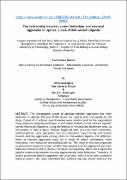The relationship between voters’ behaviour and electoral aggression in Uganda: a case of mid-western Uganda
Abstract
This investigation aimed to appraise election aggression and voter behaviour in Uganda. The rule of the thumb was used to draw the sample for the study. Copies of structured questionnaires were administered to the respondents using purposive sampling technique in two urban centres in mid-western Uganda, namely Hoima and Kigorobya. Using the analysis of variance and Bonferroni tests, as instruments of data analysis, findings suggested inter alia that voter motivation, political parties, voter perception and civic education have a strong contribution towards election aggression among voters in mid-western Uganda. Put different, forms of election aggression could be a result of voters’ perception, voter motivation, civic education and political parties. The mode of elections organized by government presents a closer relationship between election aggression and voter behaviour characterised by the four variables. Consequently, there was a significant positive relationship between election aggression and voter behaviour. Therefore, if factors promoting election aggression are to be dealt with so as to have a peaceful political system, the study submitted that political big-wigs should embrace the
culture of attitudinal change and appreciate elections as a game in which there must always be a winner and a loser.
URI
https://www.academia.edu/12083325/SAAPAM_15TH_ANNUAL_CONFERENCEhttps://hdl.handle.net/123456789/208

